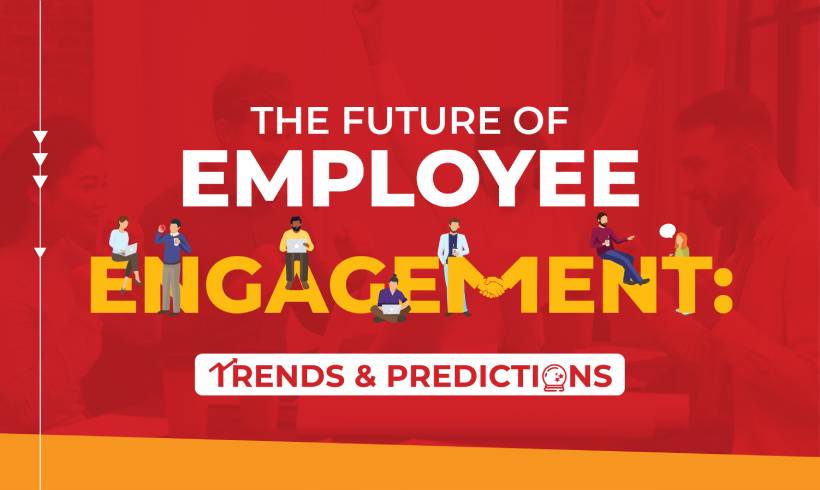

The Future of Employee Engagement: Trends & Predictions
“It’s not the strongest or the most intelligent who will survive but those who can best manage change.” — Charles Darwin While Darwin may not have specifically referenced the business realm, his words find resonance in today’s corporate landscape. Employee engagement, though abstract, holds significant importance. It represents the profound emotional connection an employee forms with their organization. The factors that foster this connection and inspire individuals to give their best efforts can differ from person to person. Moreover, these influences are subject to the ever-changing dynamics of the world at large.
As each new generation enters the workforce, the landscape of employee engagement undergoes drastic transformations. What may be effective today can quickly become irrelevant tomorrow. To stay ahead of the curve, visionary business leaders and managers must remain vigilant, continuously updating their knowledge of the latest engagement strategies. We have curated five predictions that highlight the aspects of work that leaders must prioritize going forward.
Humanizing HR: Redefining the Power of Empathy and Technology:
As technology becomes increasingly integral in HR, redefining the role of ‘Human’ is crucial. According to Businessolver, a staggering 92% of employees consider empathy as a vital factor in promoting employee retention. While digital progress is important, people still crave compassion, appreciation, and recognition. Blending emotional intelligence with technology yields remarkable results. Millennials seek belonging and value. Cultivating a compassionate culture led by empathetic leaders ensures ultimate job satisfaction. Embrace technology, but prioritize internal communication through compassionate leadership to create a thriving environment.
Stealth Talent Acquisition: The Power of Quiet Hiring for Securing Top Talent:
“Quiet hiring” refers to a trend where employers discreetly recruit and hire in-demand talent without publicly advertising job openings or conducting extensive external recruitment processes. Instead, they proactively identify and approach potential candidates through networking, referrals, and targeted search methods.
This approach allows employers to tap into a pool of highly sought-after professionals who may not be actively seeking new opportunities. By adopting quiet hiring practices, organizations can gain a competitive edge by securing top talent while maintaining confidentiality and minimizing external competition.
Breaking Boundaries: Embracing Hybrid Flexibility at the Front Lines of Work:
The concept of hybrid flexibility extends beyond traditional office settings and reaches the front lines of various industries. It involves providing a combination of remote work and on-site presence to employees in roles that were traditionally considered non-remote or location-dependent.
This flexibility allows front-line workers, such as retail associates, healthcare providers, or manufacturing staff, to have a blend of remote work and in-person responsibilities. It enables organizations to enhance work-life balance, attract and retain talent, and adapt to changing circumstances while ensuring essential operations and customer service remain efficient and effective.
Demands for Transparency in AI Recruiting: Organizations Face Pressure to Disclose Bias Audits and Hiring Metrics:
Increased concerns regarding AI bias will drive a push for greater transparency in the use of AI technology in recruiting. As more companies adopt AI systems for their hiring processes, the ethical implications associated with these practices have gained heightened urgency. In 2023, this issue is expected to reach a critical point.
For instance, New York City implemented a new law on January 1 that imposes restrictions on employers’ deployment of AI recruiting tools. To proactively address forthcoming regulations, companies employing AI and machine learning in their hiring procedures, as well as the vendors providing these services, will face mounting pressure. They will be required to enhance transparency by openly communicating their utilization of AI, making their audit data accessible to the public, and offering employees and candidates the opportunity to opt out of AI-led processes if they wish to do so.
Expanding Talent Pipelines: Embrace Nontraditional Candidates and Prioritize Skills Over Credentials:
In 2023, organizations will need to shift their approach and prioritize skills over credentials and prior experience to fill critical roles. To achieve this, they will remove formal education and experience requirements from job postings. Instead, organizations will proactively reach out to candidates from nontraditional backgrounds, both internally and externally, who may have been overlooked due to limited access to professional opportunities. By focusing on skills and potential, organizations can tap into a broader pool of talent and ensure a more inclusive hiring process.
In today’s dynamic environment, organizations addressing talent acquisition, holistic employee support, and ethical data management allows them to become preferred employers. By proactively designing comprehensive future-of-work strategies, companies can position themselves for long-term success while staying ahead of emerging trends and effectively tackling new challenges.
Ignite Engagement and Drive Success with our Impactful Solutions. Get started with Prolite today!



